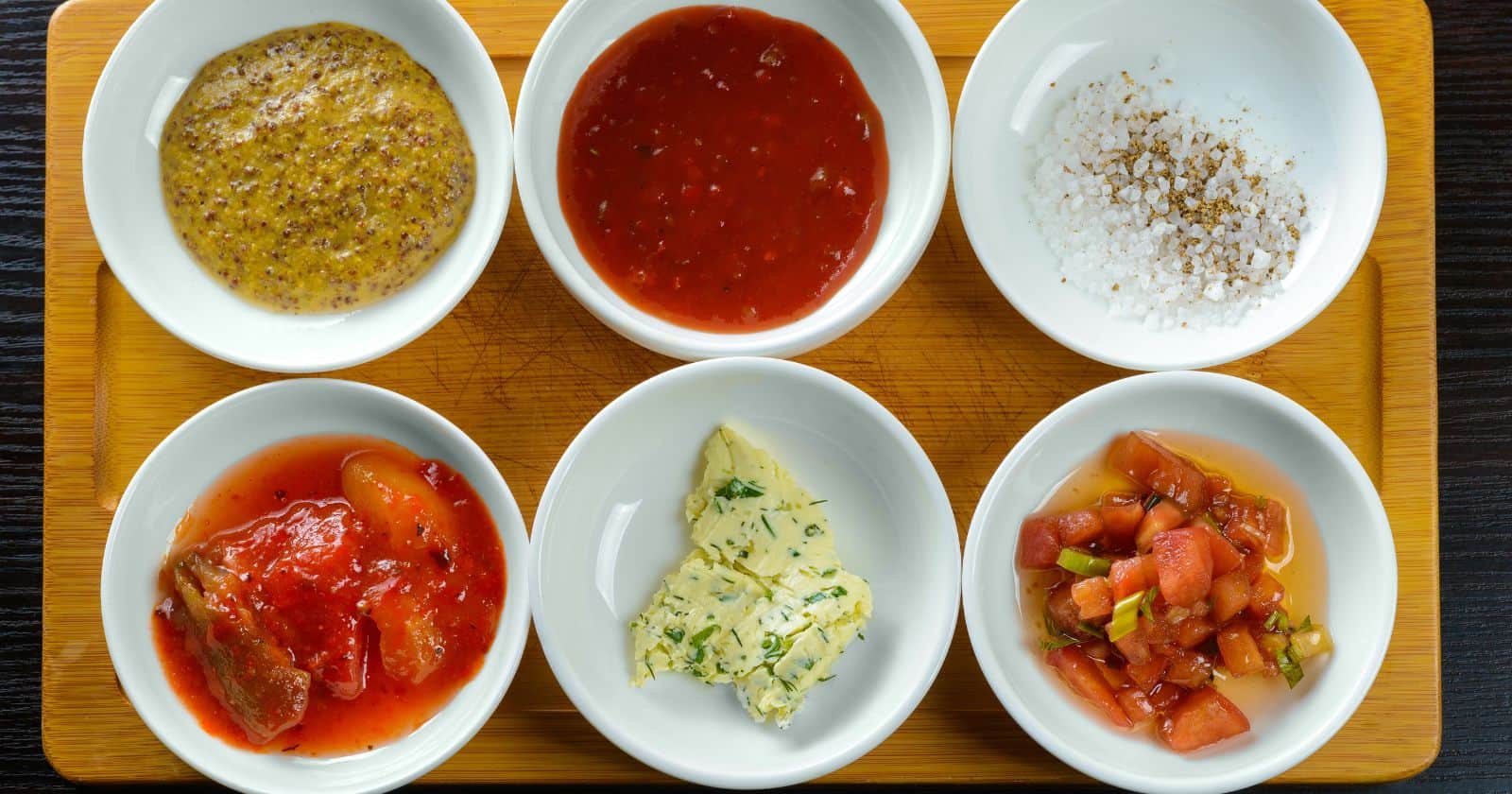Are you a fan of Korean cuisine? Do you enjoy the savory and bold flavors of Korean BBQ? If so, you may have wondered about the difference between Korean BBQ sauce and bulgogi sauce.
In this blog post, we will dive deep into the tantalizing world of these sauces, uncovering their unique characteristics and helping you decide which one suits your taste buds best.
So, what exactly sets these two sauces apart? Let’s start with bulgogi sauce, a type of Korean BBQ sauce specifically used for marinating and grilling meat. With its delightful blend of sweet and savory flavors, bulgogi sauce adds a mouthwatering umami taste to any dish. Made with ingredients like soy sauce, sugar, garlic, and sesame oil, it creates a perfect harmony of flavors that can elevate your grilled meat to a whole new level.
On the other hand, Korean BBQ sauce encompasses a broader range of sauces used in Korean BBQ dishes. While it shares some similarities with bulgogi sauce, it generally leans towards a sweeter and less spicy profile.
Common ingredients in Korean BBQ sauce include soy sauce, sugar, garlic, ginger, and sesame oil. This versatile sauce can offer various flavor profiles, depending on the recipe used.
The Difference between Korean BBQ Sauce and Bulgogi Sauce
Korean BBQ sauce is a broad term that includes various sauces used in Korean BBQ dishes, and not all Korean BBQ sauces are specifically Bulgogi sauce. Korean BBQ sauce can have different flavors and ingredients, depending on the specific dish or region. It is commonly used as a marinade or glaze for grilling or barbecuing meat.
On the other hand, Bulgogi sauce is a specific type of Korean BBQ sauce or marinade. It has a slightly sweet and umami flavor and is typically used for marinating and grilling thinly sliced beef. Bulgogi sauce is often made with ingredients like soy sauce, sugar, garlic, ginger, and sesame oil. It is commonly used in the preparation of bulgogi, a popular Korean dish made with marinated beef.
In summary, while Korean BBQ sauce is a broader term encompassing various sauces used in Korean BBQ dishes, Bulgogi sauce is a specific type of Korean BBQ sauce with a slightly sweet and umami flavor. Bulgogi sauce is commonly used for marinating and grilling thinly sliced beef in the preparation of bulgogi.
Understanding Bulgogi Sauce: A Delightful Blend of Sweet and Savory Flavors
Bulgogi sauce is a popular sauce or marinade used in many Korean dishes. It is a sweet and savory sauce that uses soy sauce as its base, and it incorporates a variety of flavorful ingredients. The sauce typically includes soy sauce, brown sugar, pear juice, garlic, ginger, ground black pepper, and sesame oil. It has a slightly sweet and umami flavor that adds depth and richness to dishes.
Traditionally, Bulgogi sauce is made with Korean pears. However, if Korean pears are not available, you can substitute with pear juice, apple juice, or pineapple juice to achieve a fruity sweetness in the sauce. The addition of fruit juice adds a delicious undertone to the sauce.
Bulgogi sauce is commonly used in the preparation of bulgogi, a popular Korean dish made with marinated beef. The sauce is used as a marinade or glaze for grilling or barbecuing the meat. The combination of the sweet and savory flavors of the sauce enhances the taste of the beef, creating a delightful blend of flavors.
Exploring Korean BBQ Sauce: A Sweeter and Versatile Option
Korean BBQ sauce, also known as Bulgogi sauce, is a delicious and versatile option that can elevate your dishes with its sweet and savory flavors. Here are some key points to know:
Sweet and Savory Flavor Profile:
- Korean BBQ sauce has a distinct flavor profile that combines sweetness with a hint of spiciness. It offers a perfect balance between the two, creating a mouthwatering experience.
- The sauce is made with ingredients like soy sauce, garlic, and toasted sesame seeds. These ingredients contribute to the unique taste of the sauce.
Usage and Versatility:
- Korean BBQ sauce is commonly used in the preparation of bulgogi, a popular Korean dish made with marinated beef. It serves as the perfect marinade for the meat, enhancing its taste and tenderness.
- Apart from being used in bulgogi, this sauce can also be utilized in various other dishes. It is a great option for glazing meats like chicken, pork, and even vegetables.
- The versatility of Korean BBQ sauce extends beyond traditional Korean cuisine. It can be used in tacos, wings, ribs, sandwiches, and more, adding a delightful blend of flavors.
Homemade Versus Store-bought:
- Many people prefer homemade versions of Korean BBQ sauce as they allow for customization. You can adjust the sweetness, spiciness, or any other flavors according to your preference.
- Store-bought versions often contain additives and preservatives to increase shelf life. Making your own sauce ensures a more natural and healthier option.
Ingredients in Bulgogi Sauce: Unveiling the Perfect Harmony of Flavors
Bulgogi sauce is a key component of Korean cuisine, particularly in the preparation of bulgogi, a popular Korean dish made with marinated beef. This sauce is known for its perfect harmony of flavors, combining sweet and savory notes that delight the taste buds. Let’s take a closer look at the ingredients that create this delicious balance:
Soy Sauce: The foundation of bulgogi sauce, soy sauce provides a salty and umami flavor that forms the base of the sauce, enhancing the overall taste.
Sugar: To balance out the savory flavors and add a touch of sweetness, sugar is added to the sauce. This helps to create a well-rounded taste profile.
Garlic: One cannot talk about bulgogi sauce without mentioning minced garlic. This ingredient adds a pungent and savory flavor that is essential to the overall taste of the sauce.
Sesame Oil: A few drops of sesame oil go a long way in bulgogi sauce. This ingredient adds a nutty and depth of flavor, elevating the sauce to another level.
Green Onion: Chopped green onion is a key ingredient that brings a fresh and mild onion flavor to the sauce. It adds a touch of brightness to the overall taste profile.
Ginger: Grated ginger adds a warm and slightly spicy flavor to the sauce, enhancing its complexity and depth. It contributes to the overall harmony of flavors.
Pear Juice or Applesauce: To add a fruity sweetness to the sauce, pear juice or applesauce is often incorporated. This ingredient complements the savory components of the sauce and adds a delightful twist.
Toasted Sesame Seeds: Finally, toasted sesame seeds are frequently added to the sauce for a nutty and crunchy texture. They provide a delightful contrast and enhance the overall sensory experience.
Ingredients in Korean BBQ Sauce: A Mix of Soy Sauce, Sugar, Garlic, Ginger, and Sesame Oil
Korean BBQ sauce is a flavorful combination of various ingredients that create a sweet and savory sauce commonly used in Korean cuisine. The key components of this sauce include:
Soy Sauce: Soy sauce is a crucial element in Korean BBQ sauce as it provides a salty and savory flavor, forming the base of the sauce.
Sugar: Sugar is added to balance the salty flavors of soy sauce and to introduce a pleasant sweetness to the sauce.
Garlic: Minced garlic is another essential ingredient in Korean BBQ sauce, adding a strong and pungent flavor that enhances the overall taste.
Ginger: Grated ginger adds a warm and slightly spicy flavor to the sauce, providing a pleasant contrast and depth of flavor.
Sesame Oil: Sesame oil is used to incorporate a nutty and rich taste to the sauce, adding to its complexity.
In addition to these primary ingredients, there are other components that can be included in Korean BBQ sauce to further enhance its flavor profile:
- Water: Water is often added to thin out the sauce and adjust its consistency, ensuring it coats the meat or vegetables evenly.
- Rice Vinegar: Rice vinegar is sometimes used to add acidity and balance to the sauce, enhancing its overall taste.
- Chili Paste or Sriracha: For those who enjoy spiciness, chili paste or sriracha can be added to the sauce, providing a fiery kick.
- Red Pepper Flakes: Red pepper flakes can be included in the sauce to introduce a mild level of spiciness, adding another layer of flavor.
Taste Profiles: Comparing the Umami of Bulgogi Sauce to the Sweetness of Korean BBQ Sauce
When comparing the taste profiles of Bulgogi sauce and Korean BBQ sauce, it becomes clear that both offer a unique blend of sweet and savory flavors. However, there are some key differences that set them apart.
Bulgogi sauce is known for its perfect harmony of flavors, with a balance of sweetness and savory notes. It gets its sweetness from ingredients like pear juice or applesauce, as well as brown sugar. This fruity undertone adds a refreshing twist to the sauce. Additionally, the garlic and ginger in Bulgogi sauce contribute complexity and depth of flavor, while soy sauce provides the salty and savory elements.
On the other hand, Korean BBQ sauce also offers a sweet and savory experience, but with a hint of spiciness. It strikes a balance between sweet, salty, and savory notes. Like Bulgogi sauce, it contains soy sauce for a salty and savory base, but it also incorporates sugar to enhance the sweetness and balance out the saltiness. The garlic and ginger in Korean BBQ sauce add a pungent and slightly spicy flavor, while sesame oil brings nuttiness and richness to the mix.
Usage and Application: How to Best Utilize Bulgogi Sauce in Marinating and Grilling Meat
Bulgogi sauce is a versatile sauce used in Korean cuisine, commonly used in the preparation of bulgogi, a popular Korean dish made with marinated beef. Here’s how to best utilize bulgogi sauce in marinating and grilling meat:
Marinating Meat: To use bulgogi sauce as a marinade, mix the sauce with your choice of meat, such as beef, chicken, or pork. Ensure that the meat is well-coated with the sauce and let it sit for at least 30 minutes to allow the flavors to penetrate the meat. For a more intense flavor, marinate the meat overnight.
Grilling Meat: Once the meat has been marinated, it can be grilled over high heat. As the meat cooks, brush it with the bulgogi sauce to enhance the flavor and create a delicious glaze. This will give the grilled meat a rich and savory taste that is characteristic of Korean barbecue.
Stir-Frying Meat: Bulgogi sauce can also be used as a stir-fry sauce for beef, chicken, or vegetables. Simply stir-fry the meat or vegetables in a pan until they are cooked through. Then, add the bulgogi sauce and continue cooking until the sauce thickens and coats the ingredients. This creates a flavorful and tangy stir-fry dish.
Dipping Sauce: If you prefer, you can use bulgogi sauce as a dipping sauce for grilled meat or vegetables. Simply serve the sauce on the side and dip the cooked meat or vegetables into the sauce. This adds an extra layer of flavor and can enhance the overall enjoyment of the meal.
Substitutes: If you don’t have bulgogi sauce on hand, there are several substitutes that you can use. Teriyaki sauce, hoisin sauce, or a mixture of soy sauce, brown sugar, and garlic can be used as alternatives. While these substitutes may have slightly different flavors, they can still provide a delicious result when marinating and grilling meat.





